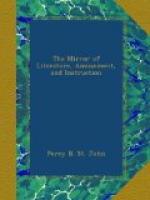Ev’n till thy latest hour, Lucretia!
thou
Didst cherish that which but consum’d
thy frame.
’Twas then it shone the brightest
on thy brow,
Like the last flickerings of an earthly
flame—
Yes, thy brain harass’d by deep
toil, became
With all its fire, a tenant of the tomb,
And dim is now thine eye, Belov’d
of Fame!
Thy cheek is pale—thy lip without
perfume—
And there thou liest—the child
of Genius—and its doom.
Like the proud eagle soaring to the skies,
Intent “the topmost arch”
of heaven to scale,
When heeding naught that would oppose
its rise,
It breaks with fearless nerve the tempest-gale—
And spreads its wings like a majestic
sail,
Full on the bosom of the raging blast,
Thy spirit soar’d—but
ah! too like us frail,
When the same breeze which bore it from
the dust
Wing’d home the fatal shaft that
tore its bleeding breast.
Would I could sing thy fame with thine
own lyre,
Then should I breathe a more deserving
lay,
A lay which every spirit would inspire,
And melt each eye to tears of sympathy;
But others at thy shrine, their tributes
pay.
Offspring of Beauty! child of native song!
And I, ev’n I, would venture to
essay,
To raise my lauding voice amidst the throng
Of those who weep thy loss—and
who shall weep it long!—N.C.
[2] See Memoir, and specimens
of her Poetry, Mirror, vol.
xiv. p. 340.
* * * * *
SPIRIT OF DISCOVERY.
* * * * *
IMPROVED RAW SUGAR.
[We find the following information
communicated to the
Literary Gazette, apparently
by the parties connected with
the improvement.]
Considerable interest has been excited in the market by the introduction of an improved native raw sugar, which portends very great advantages to all who are engaged in this so long unprofitable branch of colonial and commercial intercourse. It is pure raw sugar, obtained direct from the cane-juice, without any secondary process of decoloration or solution, and by which all necessity for any subsequent process of refining is entirely obviated. It is obtained in perfectly pure, transparent, granular crystals, being entirely free from any portion of uncrystallisable sugar or colouring matter, and is prepared by the improved process of effecting the last stages of concentration in vacuum, and at a temperature insufficient to produce any changes in its chemical composition; the mode of operation first proposed by the late Hon. Ed. Charles Howard, and subsequently introduced, with the most important advantages and complete success, into the principal sugar-refineries of Great Britain.




